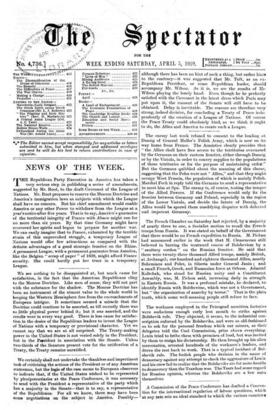We certainlyshall not undertake the thankless and impertinent task of
criticizing the actions of the President or of any American statesman, but the logic of the case seems to European observers to indicate that, if the United States wished to be represented by plenipotentiaries at the Peace Conference, it was necessary to send with the President a representative of the party which has a majority in the Senate—that is to say, a representative of the Republicans. For all we know, there may have been some negotiations on the subject in America. Possibly although there has been no hint of such a thing, but rather hints to the contrary—it was suggested that Mr. Taft, as an ex- Republican President, or some Republican leader, should accompany Mr. Wilson. As it is, we see the results of Mr. Wilson playing the lonely hand. Even though he be perfectly satisfied with the Covenant in the latest dress which Paris may put upon it, the consent of the Sedate will still have to be obtained. Delay is inevitable. The reasons arc therefore very strong, indeed decisive, for concluding a Treaty of Peace inde- pendently of the creation of a League of Nations. Of course the Peace Treaty could absolutely bind, as we think it ought to do, the Allies and America to create such a League.






































